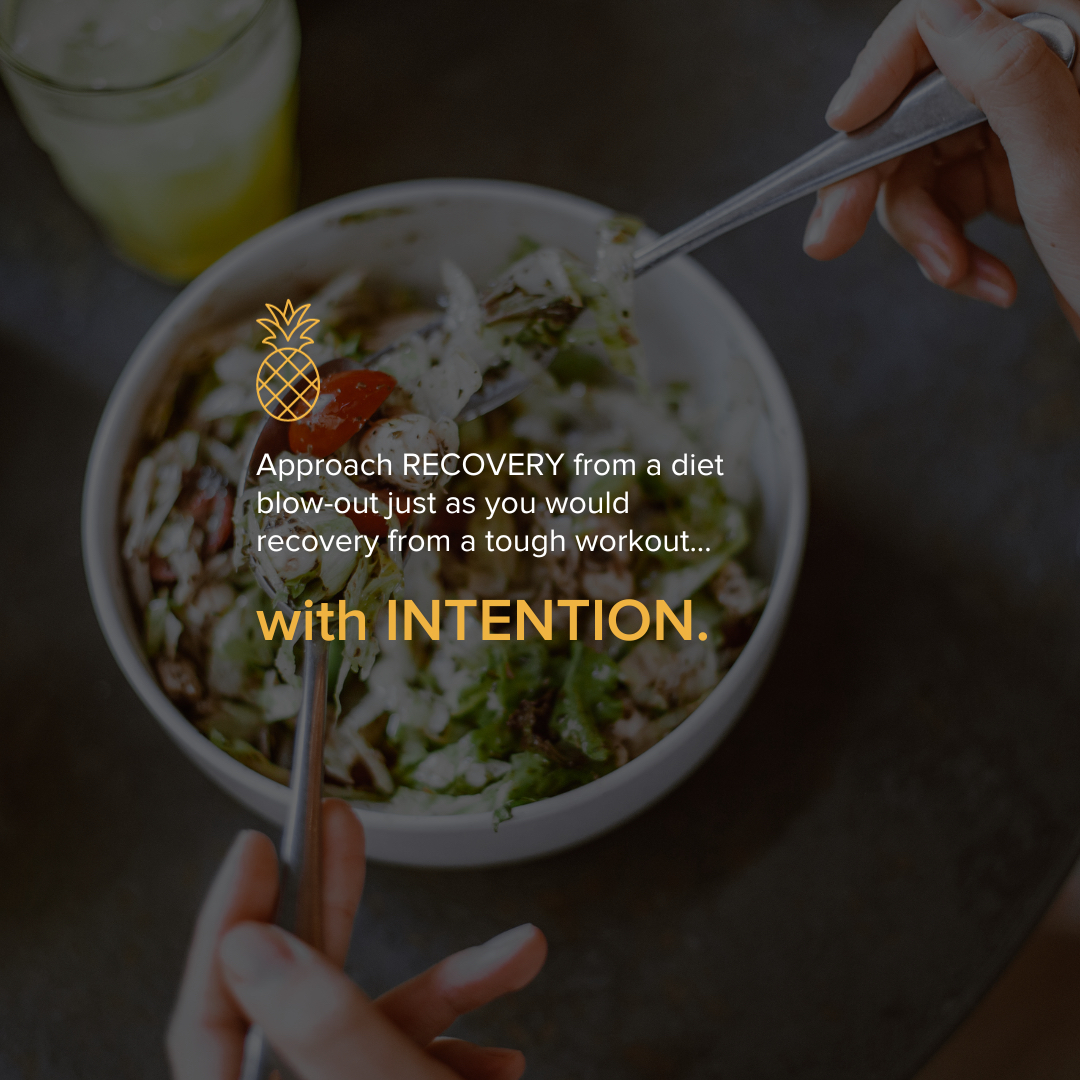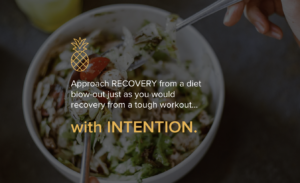May 30, 2020
Originally posted in July 2017, updated and made more awesome in May 2020.
“Help, I had a treat meal and now I can’t stop eating!”
Tips to Tackle the Treat Meal, How Overindulging Can Derail You & What To Do About It
(note: if you’re reading this because you’ve already ‘overdone’ it and want to skip straight to the ‘what to do about it’ part – scroll to the bottom of page!)
You’ve probably heard me say it before –
One crazy indulgent meal a week is not going to make you fat and unfit. Just as one healthy salad with lean chicken meal a week won’t make you skinny or fit.
This is something I learned from my coach back in my fitness & physique competing days. And let me tell you, it was a life-saver!
It makes sticking to your nutrition plan the rest of the week soooo much easier!
No one likes to feel deprived. It just makes us want all the things that much more. Allowing yourself a treat meal once a week means you are ‘allowed’ to have that, you’re just choosing to have it at a pre-planned time (ps: it’s good practice to schedule it in when it’s gonna mean the most for you – like a social event coming up on the weekend).
Whenever I decide to check in on my nutrition and incorporate a treat meal, I collect things for my treat meal. For example, someone offers me a ginger cookie (my fav!) on Tuesday, I gratefully accept and tuck it away in a baggie to save for Saturday. I have a craving for chocolate covered almonds that I know are in my pantry, I hide the bag away & plan to have some on Saturday. By the time Saturday comes, I might have a load of treats I plan to have in that one sitting (which by the way, I rarely end up eating all of it, unlike had I allowed myself to have them whenever the whim hit me throughout the week). I find it really helpful to know that I CAN have the things I love, I’m just choosing when I will.
Oops, I think I overdid it…
But what if you overdo it and feel like crap?
Overindulging on a heavy meal that no longer has any resemblance to whole foods and is a bazillion times more total calories than you ate all week can thrust you into a cycle of low energy and motivation, and increased hunger with intense cravings…all the things that derail our diets and sabotage our fitness gains.
If this is you, don’t beat yourself up too badly. Understanding the impact on your body (your physiology) can help you put away the beating stick, and instead tackle it with a plan that’ll help you get back on track right away.
So… the physiology of it.
Firstly, when we give ourselves permission to indulge, it often comes with copious amounts of refined sugar. Decadent cupcakes, ice cream, m&m’s by the droves… it’s not surprising we want these quick absorbing carbs, as our intense training in the gym all week has likely left our muscle glycogen stores a bit on the low side and the body is telling us it’s time to fill-up the tank.
The obvious problem with excessive consumption of refined sugar is that it sends the blood sugars into chaos, which can contribute to intense sleep and body temperature fluctuations, headaches, stomach troubles, and to energy imbalances (the sugar high and crash). When the crash comes, the body will try to protect itself and the brain will emit signals that we are hungry – and need food NOW. Hence the compulsive cravings for more carbs that the body thinks will help to stabilize our rollercoaster-riding glucose levels.

.
In addition to energy deregulation and blood sugar instability, sugar instantly depresses the immune system. Studies show that in as little as 30 minutes after consuming 20 tsp of refined sugar (the equivalent of a 590 ml Coca Cola, a large bowl of Fruit Loops, or one cinnamon bun), there is up to a 50% drop in the ability of white blood cells to kill bacteria, for up to 5 hours after consumption. This is bad news for a training athlete who cannot afford missed days in the gym. (for our knowledge nerds, see studies noted below).
If that weren’t enough, sugar is the biggest offender in creating inflammation in the body. As athletes, that is something we want to avoid, whether it’s increased skeletal muscle inflammation or digestive or systemic inflammation.
Another common pitfall we often make as bodybuilders or fitness competitors who eat chicken, chicken, fish, and more chicken, is forgoing protein altogether when we have a treat meal, in favor of pasta, pizza or the likes. When all these carbs get absorbed (albeit at a slower rate than simple sugars), they all eventually get converted to sugars in the body, and we are now experiencing much the same ill effects as noted above.
About now I reckon your eyes are widening with shock at the notion I might actually be suggesting you should not ever enjoy the occasional indulgence of your favorite treats!? Relax, I’d never do that (I couldn’t refrain myself either).
Holistic wellness is about finding balance, and in this case, specifically it’s about finding ways to occasionally enjoy your favorite things while mitigating some of the associated consequences to your wellbeing and to your athletic training.
10 ways to make the most of your treat meal:
1. Remember it’s a treat meal, not an entire day!
Many of us “all or nothing” personalties convince ourselves that the day is shot anyway, but it is NOT! Staying on track the rest of the day, before or after your relaxed patio lunch or exquisite dinner out will go a long way in helping your body adjust and recover from your indulgence.
2. DO eat healthfully the rest of the day, but do NOT skip an earlier meal.
Did you know that skipping lunch to save the calories you plan to make up for later when you go out for dinner actually backfires and sabotages your weight loss efforts even more?! Skipping an entire meal or going several hours with nothing to eat will lead to low blood sugar levels, slow down your metabolic engines, and incite significantly increased hunger and cravings –> all of which will very likely harm more than help support your goals.
Go ahead and eat on the lighter side for lunch perhaps, choose more fibre-rich veggies than you otherwise might, and perhaps reduce the carbs. But get something in you so that blood sugars, energy production, and metabolic rate are not impaired.
3. Always have PROTEIN with your treat meal.
It will slow the digestion and absorption of carbohydrates in the body, thereby reducing spikes in blood sugar levels. Protein also has a thermogenic effect and including it will help your body to metabolize and burn off those bazillion treat meal calories. I get it, there’ll be no baked chicken breasts on Saturday night, but how about a juicy 6 ounce ribeye or rack o’ ribs?
4. Fibre-fibre-fibre!
I know, I know – who wants salad with a treat meal?! But if you could possibly muster up the mental stamina to include some fibre-rich greens with your pizza, wings or nachos, that wholesome fibre will go a long way in helping the body digest and excrete the not-so-wholesome stuff.
5. Eat slowly because satiety is delayed.
It can take 15-30 minutes for these signals to reach the brain and register that you are full. Not only does this help lessen the overall amount consumed, it fosters healthy digestion and feeds the soul as you savour and enjoy your well-deserved meal.
6. Take a digestive enzyme.
If tummy troubles often ensue after an indulgence, take a digestive enzyme prior to eating can be helpful.
7. Avoid drinking fluids while eating.
Although you may have heard it’s a good idea to drink plenty of water while eating, it’s quite the opposite. Fluids, especially cold beverages, inhibit digestion by diluting and halting function of the digestive acids being secreted by the stomach. Sluggish digestion of a heavy meal on a regular basis can contribute to digestive and intestinal imbalances, promoting more inflammation, depleted nutrient absorption, and reduced immunity. Drink a large glass of water about 30-60 minutes before eating a large meal, but then reduce intake of fluids during the meal to optimize digestion.
8. Choose cleaner treats.
Yes, treats can be clean, whole foods based and still taste amazingly sinful! Desserts sweetened naturally with honey, molasses, fruit or raw cacao can satisfy the taste buds with far less harm than those of refined sugar. Check out our many clean treat recipes. It’s easier to control at home, of course, but many restaurants are now shifting and offer more variety in whole foods based meals and desserts as well.
9. Avoid alcohol.
What can we say?! Sorry, but alcohol is not your friend if weight loss or athletic performance is the goal. However, one or two drinks may go a long way in helping you relax and reduce stress hormone cortisol levels in the body – that’s gotta be good, right?! Here’s how to offset the detrimental effects of drinking:
- have one large full glass of water with or between each alcoholic beverage
- be sure to eat protein with your meal prior to consuming alcohol (see above notes on protein)
- supplement with 3000g of vitamin C and a B-complex on the day you plan to have a couple drinks (these nutrients will help the body mitigate consumption-related depletions that occur)
- supplement with L-glutamine before and after having a couple drinks (a natural antioxidant and is key in alcohol detoxification)
10. Enjoy it!
Remember that one over indulgence per week will not make you fat and unfit, just as one healthy salad per week will not make you lean and fit. Plan your treat meals wisely to use them to your best advantage. Got a friend’s birthday get-together coming up, plan your treat meal for then. Or maybe a treat meal just happens – the day gets away from you and somehow dinner becomes buttered popcorn (✋🏼 guilty as charged). Regardless, have it – enjoy it – let it go and get back to business tomorrow.
And here’s what you must do AFTER the treat meal to get back on track:
You’re probably gonna feel like a big blob and just want to lounge around Netflix’ing all day. Don’t do it! Pull up your big girl/boy panties and be intentional with your ‘recovery’ from the diet blow-out, just as you would be intentional in stretching and rolling out your tight muscles after a tough workout.
8 ways to give your body a little extra TLC after a treat meal to help undo the overdo:
- LET IT GO. After your treat meal, forget about it! Just like one healthful meal of lean protein and a big salad isn’t going to make you shredded, one over-indulgent treat meal won’t ruin you either. Get back on-plan and carry on.
- DRINK PLENTY OF WATER to flush and eliminate any toxins and sodium retention, as well as support good digestion. Adding a tsp of fresh lemon juice or apple cider vinegar to your water throughout the day also has a cleansing effect.
- If you’re prone to blood sugar instability, RATION YOUR CARBS equally throughout the day to foster glucose stability and reduce cravings that might otherwise render you treating yourself again.
- ANTI-OXIDANT & ANTI-INFLAMMATORY rich foods such as chia, pineapple, fresh spinach and ginger are great options to help mitigate inflammatory responses in the body, and make for great additions to your morning protein smoothie.
- Eat a few extra FIBRE-RICH VEGGIES the next day or two to help gently cleanse & restore gut function.
- If you experience headaches, sage or LAVENDER OIL dabbed at the temples can bring natural relief.
- Put those new storages of muscle glycogen to good use and GET TO THE GYM for a stellar workout.
- Don’t punish yourself with the scale – WAIT at least 2-3 days before weighing yourself
When treat meals are not an option…
For those who need to hear this –
If allowing yourself a treat meal is like opening Pandora’s box, I understand. You know yourself best. Avoid the treat meal entirely if that’s what best supports you right now. And if you ever want a little extra guidance or support, you know where to reach me 😊
Resources:
- Sanchez, A., Reeser, J. L., Lau, H. S., Yahiku, P. Y., Willard, R. E., McMillan, P. J., … & Magie, A. R. (1973). Role of sugars in human neutrophilic phagocytosis. The American Journal of Clinical Nutrition, 26(11), 1180-1184.
- This study investigates the effects of glucose and other sugars on human neutrophilic phagocytosis, an essential component of the immune response.
- Yan, Y., Jiang, W., Spinetti, T., Tardivel, A., Castillo, R., Bourquin, C., … & Guarda, G. (2013). Omega-3 fatty acids prevent inflammation and metabolic disorder through inhibition of NLRP3 inflammasome activation. Immunity, 38(6), 1154-1163.
- While this study primarily focuses on omega-3 fatty acids, it also discusses the impact of a high-sugar diet on inflammation and immune response.
- Calder, P. C., Ahluwalia, N., Albers, R., Bosco, N., Bourdet-Sicard, R., Haller, D., … & Grant, R. (2013). A consideration of biomarkers to be used for evaluation of inflammation in human nutritional studies. British Journal of Nutrition, 109(S1), S1-S34.
- This paper provides a comprehensive overview of biomarkers for evaluating inflammation, including those related to dietary factors such as sugar.
- Meydani, S. N., Ha, W. K., & Blumberg, J. B. (1991). Effect of dietary zinc deficiency on the immune response of young and old mice. The Journal of Nutrition, 121(3), 418-425.
- While this study primarily explores the effects of zinc deficiency, it touches on the interplay between nutrition and immune response, including the potential impact of dietary factors like sugar.
- Myles, I. A. (2014). Fast food fever: reviewing the impacts of the Western diet on immunity. Nutrition Journal, 13(1), 1-16.
- This review article discusses the impacts of the Western diet, which often includes high levels of refined sugars, on the immune system.
Treat Meal: How to Allow Yourself One & Recover From It
The entire contents of this website are based upon the opinions of Build Holistic Nutrition. Please note that Build Nutrition is not a dietitian, physician, pharmacist or other licensed healthcare professional. The information on this website is NOT intended as medical advice, nor is it intended to replace the care of a qualified health care professional. This content is not intended to diagnose or treat any diseases. Always consult with your primary care physician or licensed healthcare provider for all diagnosis and treatment of any diseases or conditions, for medications or medical advice, as well as before changing your health care regimen.
© BUILD NUTRITION 2026. ALL RIGHTS RESERVED. PRIVACY POLICY
Go ahead, creep us on social. You know you want to!

